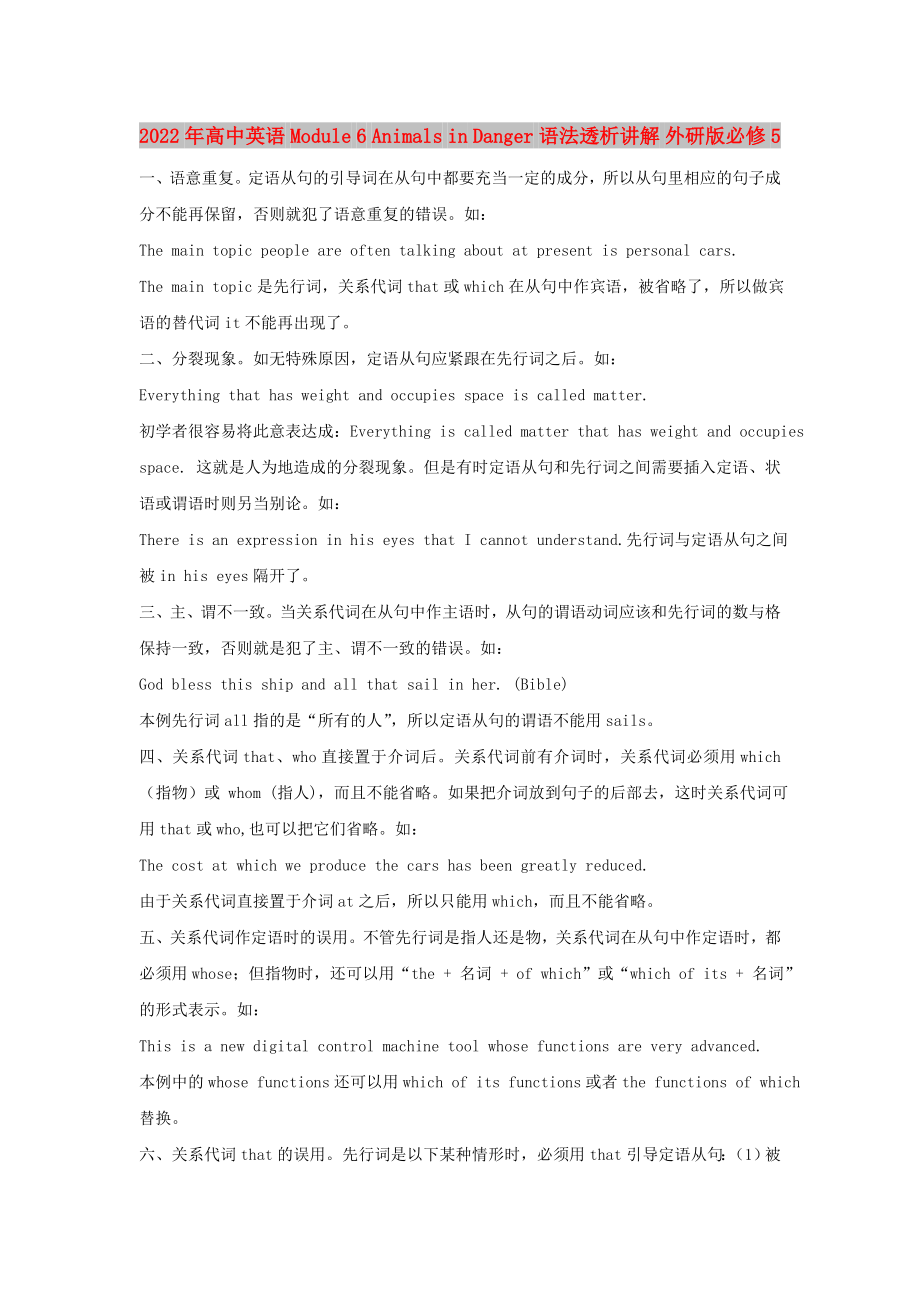《2022年高中英語 Module 6 Animals in Danger 語法透析講解 外研版必修5》由會員分享��,可在線閱讀��,更多相關(guān)《2022年高中英語 Module 6 Animals in Danger 語法透析講解 外研版必修5(2頁珍藏版)》請在裝配圖網(wǎng)上搜索����。
1�����、2022年高中英語 Module 6 Animals in Danger 語法透析講解 外研版必修5
一��、語意重復(fù)。定語從句的引導(dǎo)詞在從句中都要充當一定的成分�����,所以從句里相應(yīng)的句子成分不能再保留����,否則就犯了語意重復(fù)的錯誤。如:
The main topic people are often talking about at present is personal cars.
The main topic是先行詞����,關(guān)系代詞that或which在從句中作賓語,被省略了���,所以做賓語的替代詞it不能再出現(xiàn)了�。
二����、分裂現(xiàn)象。如無特殊原因�����,定語從句應(yīng)緊跟在先行詞之后����。如:
Everything
2、 that has weight and occupies space is called matter.
初學(xué)者很容易將此意表達成:Everything is called matter that has weight and occupies space. 這就是人為地造成的分裂現(xiàn)象���。但是有時定語從句和先行詞之間需要插入定語�����、狀語或謂語時則另當別論�。如:
There is an expression in his eyes that I cannot understand.先行詞與定語從句之間被in his eyes隔開了���。
三�����、主���、謂不一致。當關(guān)系代詞在從句中作主語時�,從句的謂語動
3、詞應(yīng)該和先行詞的數(shù)與格保持一致�����,否則就是犯了主、謂不一致的錯誤�。如:
God bless this ship and all that sail in her. (Bible)
本例先行詞all指的是“所有的人”,所以定語從句的謂語不能用sails��。
四���、關(guān)系代詞that����、who直接置于介詞后����。關(guān)系代詞前有介詞時,關(guān)系代詞必須用which(指物)或 whom (指人)����,而且不能省略。如果把介詞放到句子的后部去��,這時關(guān)系代詞可用that或who,也可以把它們省略�����。如:
The cost at which we produce the cars has been greatly reduc
4��、ed.
由于關(guān)系代詞直接置于介詞at之后���,所以只能用which����,而且不能省略���。
五�����、關(guān)系代詞作定語時的誤用���。不管先行詞是指人還是物,關(guān)系代詞在從句中作定語時���,都必須用whose���;但指物時,還可以用“the + 名詞 + of which”或“which of its + 名詞”的形式表示�。如:
This is a new digital control machine tool whose functions are very advanced.
本例中的whose functions還可以用which of its functions或者the functions of which
5、替換��。
六、關(guān)系代詞that的誤用���。先行詞是以下某種情形時��,必須用that引導(dǎo)定語從句:(1)被形容詞最高級或序數(shù)詞修飾��;(2)被every, only, any, just, right, no等詞修飾�����;(3)是all, few, little, much, none, some以及anything, everything, nothing (something不受此限制)等不定代詞��;(4)同時為人和物����;(5)為疑問代詞時�����。如:
Everything that appears on the Internet is very appealing.
初學(xué)者由于記得不牢��,此時常常誤用whic
6�����、h引導(dǎo)。
七���、非限制性定語從句誤用that作引導(dǎo)詞。引導(dǎo)非限制性定語從句時�����,不能用that�,必須用which。此外可以引導(dǎo)非限制性定語從句的還有who�,whom,where�����,when��,as等關(guān)系代詞或關(guān)系副詞,而且不能省略����。如:
The Italian team defeated the German team, which some people had expected.
此時還可以將which換成as,意思是“正如有的人已經(jīng)預(yù)料到的一樣”����。
八����、as和which的誤用���。非限制性從句前置于句首時�����,不能用which���,而要用as來引導(dǎo)。如:
As is well known to u
7�、s all, life can’t exist without air or water.
但是如果從句后置,則兩者皆可以�����,只是意思略有區(qū)別(as譯作“正如”�,which譯作“這一點”等)。如果定語從句是否定形式或從句謂語帶有復(fù)合賓語時��,則只能用which引導(dǎo)�����。如:
The Brazilian team was defeated by the French team, which we hadn’t expected.
九、the same ... that和the same ... as的誤用���。注意兩者的區(qū)別:the same ... that指“同一人(物)”�����;而the same .
8、.. as指“同一類人(物)”��。如:
The people in many other Asian countries have the same custom as we Chinese have.
根據(jù)例句的含義�,可知這里只能用關(guān)系代詞as,不能用that����,因為表達的意思是“相似”。
十���、關(guān)系副詞與關(guān)系代詞的誤用���。如果引導(dǎo)詞在從句中作狀語應(yīng)用關(guān)系副詞引導(dǎo);如果引導(dǎo)詞在從句中作主語����、賓語��、表語時應(yīng)用關(guān)系代詞引導(dǎo)���。如:
Hawaii is a beautiful place (which / that) all the people look forward to visiting.
定語從句中的visiting是一個及物動詞,必須帶賓語�,所以不能用where作引導(dǎo)詞,而應(yīng)用which或that引導(dǎo)����,且可以省略。如果將visiting改成going���,則應(yīng)該用where引導(dǎo)�。
 2022年高中英語 Module 6 Animals in Danger 語法透析講解 外研版必修5
2022年高中英語 Module 6 Animals in Danger 語法透析講解 外研版必修5

